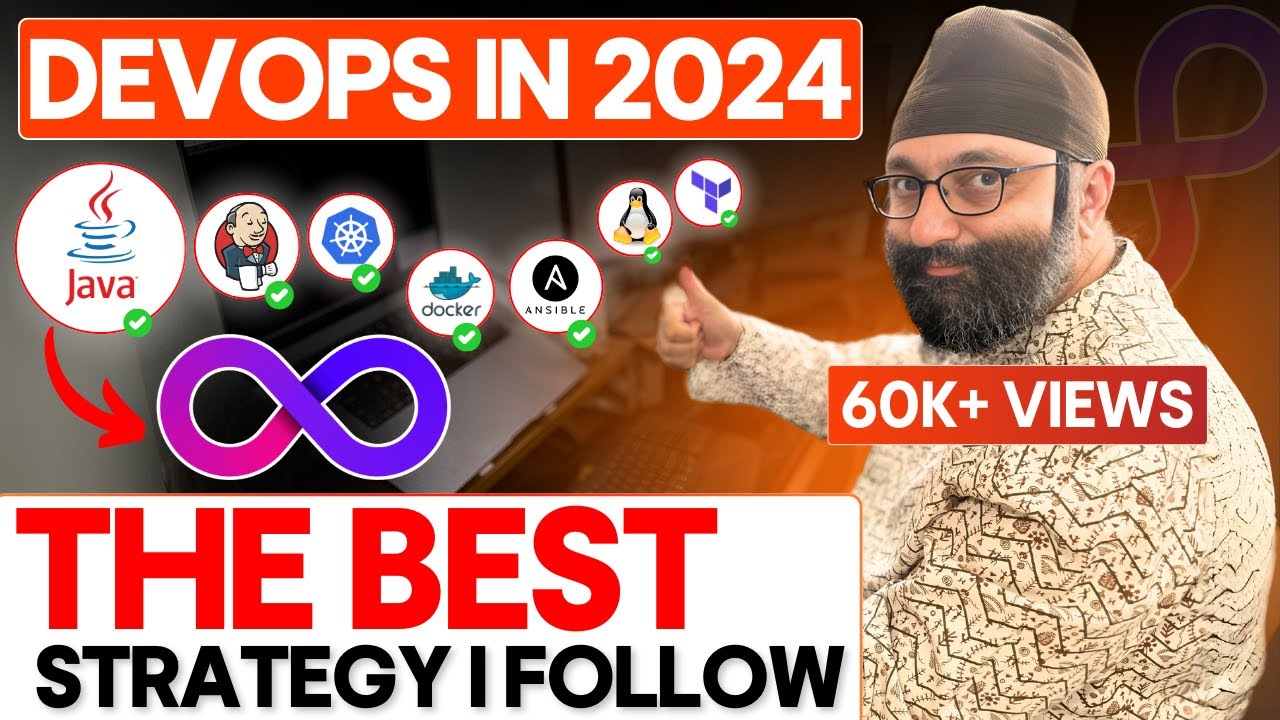How To Learn Devops In 2025 | DevOps Full Roadmap (with resources)
Summary
TLDRThis video offers a comprehensive roadmap for those entering DevOps or Cloud careers. Drawing on the speaker's 12 years of IT experience, the roadmap covers five key phases: foundational skills (Linux, scripting, programming), core IT knowledge (OSI model, protocols), cloud certifications (AWS, GCP, Azure), DevOps tools (Docker, Jenkins, CI/CD pipelines, Terraform), and real-time projects for hands-on experience. Emphasizing the importance of practical skills, certifications, and a solid project portfolio, the video provides a clear path for beginners to build expertise and stand out in the competitive DevOps and Cloud job market.
Takeaways
- 😀 DevOps and Cloud roles have overlapping topics, and the roadmap combines both, created from the speaker's 12 years of experience.
- 😀 The roadmap is divided into five phases: foundational knowledge, core IT skills, cloud technologies, DevOps tools, and projects.
- 😀 Foundational knowledge includes learning Linux, shell scripting, and a programming language (preferably Python for beginners).
- 😀 Gaining proficiency in Git and GitHub is essential early on and takes a short time to master.
- 😀 Core IT skills like the OSI model, internet protocols (DNS, DHCP, SMTP), scaling techniques, and SSL/TLS are crucial to understanding the IT infrastructure.
- 😀 Choosing a cloud platform (AWS, GCP, or Azure) depends on personal goals and market considerations. A certification in your chosen cloud is highly recommended.
- 😀 For DevOps tools, start with Docker and Kubernetes, followed by learning CI/CD tools like Jenkins, GitHub Actions, Azure DevOps, and GitLab CI/CD.
- 😀 Focus on mastering CI/CD concepts first, then learn the tools. Jenkins is suggested due to its flexibility and extensibility, but modern tools like GitHub Actions and Azure DevOps should also be explored.
- 😀 Terraform or Pulumi should be learned for Infrastructure as Code (IaC). Terraform has a planned series of tutorials to help with this skill.
- 😀 Real-time hands-on projects are necessary to validate your skills. Sharing projects on GitHub and writing technical blogs can strengthen your resume and demonstrate expertise.
- 😀 The roadmap is for beginners transitioning into DevOps and Cloud roles. Professionals already in the field will need a separate, more advanced roadmap.
Q & A
What is the purpose of the roadmap shared in the video?
-The roadmap is designed to help individuals transition into DevOps and cloud roles. It combines foundational knowledge, core IT skills, cloud proficiency, DevOps tools, and hands-on projects, based on the speaker's 12 years of industry experience.
How long does it typically take to complete the roadmap?
-The roadmap can take between 6 to 12 months depending on the individual's prior experience and the time invested in each phase.
Which programming language is recommended for beginners in the roadmap?
-Python is recommended for beginners due to its simplicity and ease of learning. GoLang may be overwhelming for those just starting.
Why is it important to understand the OSI model in the core IT skills phase?
-The OSI model is essential for understanding how devices communicate on the internet, including the protocols used at each of the seven layers, which is foundational for networking and cloud operations.
How should someone decide which cloud provider to choose (AWS, GCP, or Azure)?
-Choosing a cloud provider should be based on real-time needs and factors such as cost, services, and personal or business preferences, rather than simply following the market leader (AWS). A separate video linked in the script helps with this decision.
What is the role of certifications in the roadmap?
-Certifications help validate the skills gained during the learning process, providing a way to demonstrate expertise to potential employers. The roadmap suggests obtaining an associate-level certification in the chosen cloud provider.
What are CI/CD tools, and why are they important in the roadmap?
-CI/CD tools, like Jenkins, GitHub Actions, and Azure DevOps, automate the process of integrating code changes and deploying them. These tools are essential for streamlining development workflows and improving deployment speed and reliability.
What is the significance of learning Docker and Kubernetes in the roadmap?
-Docker is crucial for containerization, and Kubernetes is used for container orchestration. Learning these tools helps in managing and scaling applications in cloud environments, making them integral to DevOps practices.
Why is working on real-time projects emphasized in the roadmap?
-Real-time projects allow individuals to demonstrate their skills practically. These projects serve as tangible proof of ability, which is critical for standing out to hiring managers and showcasing expertise on resumes or LinkedIn.
How should one handle learning multiple CI/CD tools like Jenkins, GitHub Actions, and Azure DevOps?
-Focus on mastering the fundamentals of CI/CD rather than getting bogged down by specific tools. Understanding the core concepts of CI/CD will make it easier to switch between tools, as most use similar YAML-based syntax.
Outlines

Cette section est réservée aux utilisateurs payants. Améliorez votre compte pour accéder à cette section.
Améliorer maintenantMindmap

Cette section est réservée aux utilisateurs payants. Améliorez votre compte pour accéder à cette section.
Améliorer maintenantKeywords

Cette section est réservée aux utilisateurs payants. Améliorez votre compte pour accéder à cette section.
Améliorer maintenantHighlights

Cette section est réservée aux utilisateurs payants. Améliorez votre compte pour accéder à cette section.
Améliorer maintenantTranscripts

Cette section est réservée aux utilisateurs payants. Améliorez votre compte pour accéder à cette section.
Améliorer maintenantVoir Plus de Vidéos Connexes
5.0 / 5 (0 votes)






